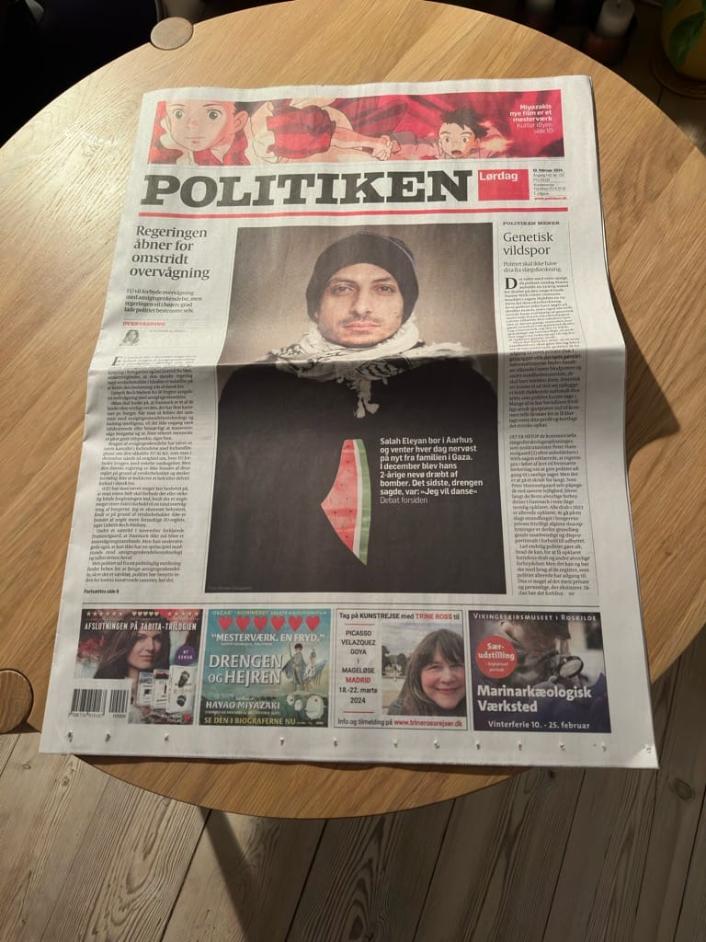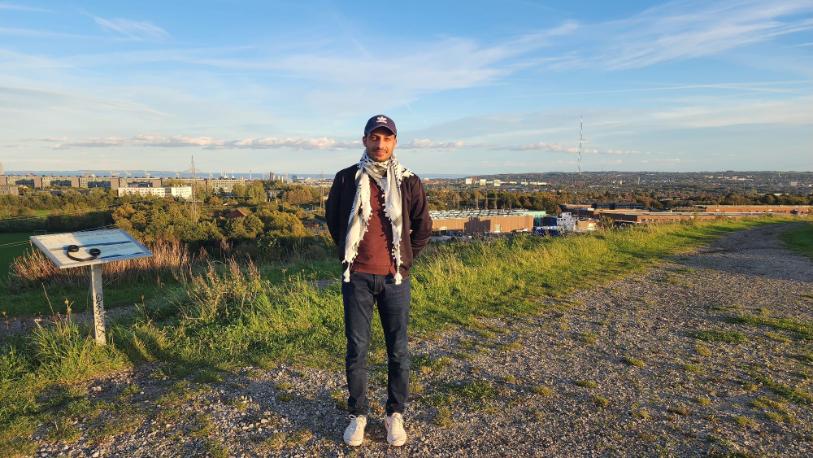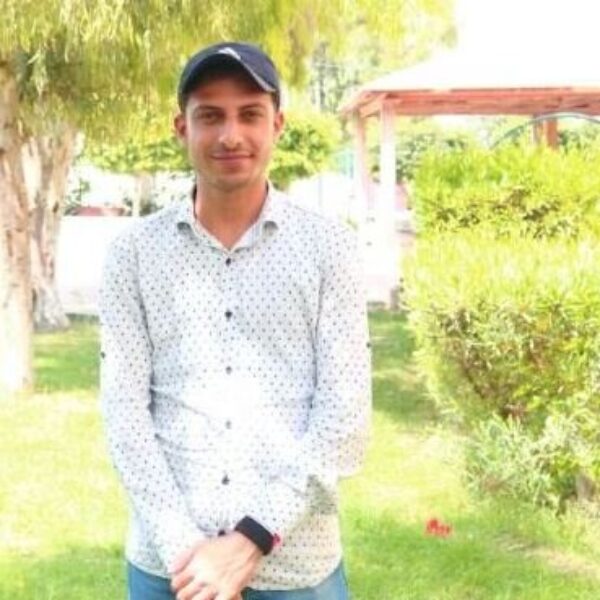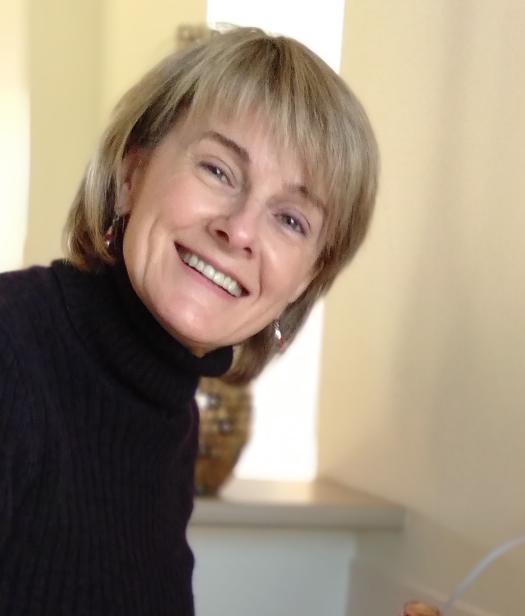
Editor’s Note: On Feb. 10, 2024, the Danish publication Politiken published an article based on an interview with We Are Not Numbers writer Salah Eleyan. An excerpt from that article, which was conducted by Susan Knorrenborg in Danish, is published below. The excerpt was translated into English by WANN mentor Bridget Smith and is published here with permission from Politiken.
Salah Eleyan was born and raised in Gaza. Barely a month before the war began, he moved to Aarhus to study. Here he now sits wondering about the Danish coverage of the conflict while he waits for news from the family. It is rarely good news.
Salah puts his mobile phone screen down so as not to look at it while I interview him. He just received a text from Gaza, but he hasn’t read it yet. It is hardly uplifting, and he is afraid of not being able to concentrate on talking to me if there is bad news from home. His entire family — parents, four sisters, three brothers, and their children — are in northern Gaza.
When the war between Hamas and Israel broke out, he had just started his studies in quantum physics at Aarhus University, but the first month of the war was spent trying to get permission to go home to his family. It was impossible.
“I felt like a kind of hostage in Aarhus. It is one of the happiest cities in the world, everywhere I saw families and children and thought that the reason you are happy is because you are together.”
What did your family say about you trying to return to Gaza?
“My mother got angry. ‘At least you’re safe. At least we’re sure you’ll survive,’ she said. ‘Don’t come back here and pressure us further.’”
Salah has realized that his travel plans will not materialize any time soon. Instead, he spends his time participating in pro-Palestinian demonstrations in Denmark, where he gives speeches about the situation in Gaza. He is one of the few local activists who was born and lived virtually his entire life in the war-torn area.
“It was when I found that people listened to what I said that I realized I could do more here than back there.”
Traumatized from a distance
Most of Salah’s day is spent following news about the war on the international media, and on social media or trying to get through to his family in the war zone. Sometimes it is possible to get an employee at a UN school or a health clinic to set up an internet hotspot so the family can talk together for a few minutes. He receives such calls in a state of eager anxiety.
“I listen intently. Is the voice normal? If it is, it means that everyone is alive. Then I just abandon caution and glide. How is sister one? What about sister two? And sister three?… and so on. Currently, the extreme lack of food fills most of the conversations. It has been like this for weeks.”
Salah’s family is starving. “They search ruins and abandoned houses for food. Vegetables or canned. But almost everything is gone. Now they are trying to grind the hard corn that we usually feed to chickens. It becomes a kind of strange flour. Everything gets eaten. Still, they scrape by on just a single meal a day.
“It’s hard. Especially since Israel is deliberately cutting off supplies of food and clean water. My family is starving because others have decided it must be so. But the funny thing is that situation doesn’t stop my mother from scolding me if she finds out that I skip breakfast before going to university. ‘You must have three meals a day,’ she says. She gets really angry with me if I skip even one.”
The flow of live news from Gaza is traumatizing. “It hurts me mentally, even though I’m far from the war zone. To sit idly by and watch as your people are killed and lives are destroyed drives you insane. Sometimes when I walk down the street, my brain just boils over. All I can think is how terribly unfair this is. I feel the same pain as my family in Gaza. I myself am part of this war zone.”
Please set them free
Was the attack a complete surprise?
“No. The situation for the Palestinians has become more and more hopeless in recent years, and the right-wing Israeli government has only made it worse: more settlements, tougher blockade. People were starving in Gaza — even before the war. At the same time, we saw the West backing Israel. No matter how much they expanded the settlements, or how many abuses they committed, the West did not seriously withdraw its support. The sense of injustice was enormous. The pressure was increasing — something had to happen.”
Salah lived in Gaza until autumn 2022, when he was allowed to travel out of the area for the first time because he was going to study in France and later in Denmark. Even in calm periods when the violence between Israelis and Palestinians was limited, everyday life in Gaza was marked by what he calls harassment from the Israeli side. By way of example, he mentions the unstable electricity supply in the area.
“The interruptions were a daily pressure. You went home from school and saw that there was no light in the houses. Then you just knew, ‘Well, now I can’t hand in my homework. Now I can’t charge my phone.’ It’s stressful.”
As a young man, he realized how difficult it was to fight for a better life.
“You go to school, high school, university. Go to great lengths, get good grades. And then what? Nothing. There are no options. No jobs.” At the same time, it was almost impossible to leave Gaza to find ways to a better life. He tried several times to get permission to travel to physics conferences in Ramallah in the West Bank, but was refused. “It was grotesque. Palestinians in Ramallah and I belong to the same country, but Israel prevents us from meeting. In fact, it was only when I came to Aarhus that I met a Palestinian who was not from Gaza, but from Jerusalem. The confinement makes the hopelessness even deeper.”
People will say, “If I have to die anyway, I will die as a warrior”
Some Palestinians saw Hamas’ attack as an uplifting act of resistance. Do you share that view?
“I have my whole family in Gaza. The most important thing for me is that they don’t get killed or hurt. That fulfills everything for me.”
So just to understand: Did you see Hamas’ attack as an uplifting act of resistance?
“It is unacceptable to kill innocent people. At the same time, all people who are occupied have the right to resist, as did the Danish people when you were occupied by the Nazis. Hamas’ attack was a violent expression of that resistance.
“It is unfair to isolate the attack from everything that has taken place in the past 75 years — ethnic cleansing, oppression, occupation, and siege. Doing so will only lead to more pain and suffering. It serves only the oppressors.”
Israel’s goal is to wipe out Hamas. Do you think it is possible?
“No, absolutely not. Even if Hamas were to fall, other fighters would take their place. As long as people don’t have freedom, self-determination, dignity, they will keep pushing for it. The next generation of Palestinians will take over. People will say if I have to die anyway, I will die as a warrior.”
Do you understand Israel’s need to defend itself after the October 7 attack?
“They are afraid of being attacked again but for Palestinians that is their daily reality. There is a theoretical risk that Israel will be attacked in the coming years, but there is a 100% certainty that a Palestinian child will be killed within the next 10 minutes. It’s as if you forget the most important thing: the common humanity of ordinary people. I would love to meet an Israeli and say: Hey, I’m from Gaza. I’m not what you’ve been told. I’m also just a human being.”
Read the full article at Politiken (in Danish).











